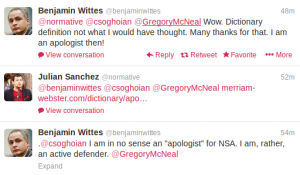Dianne Feinstein Gives NSA Apologist Ben Wittes More “Oversight” Time than Ron Wyden
 The Senate Intelligence Committee hearing on NSA changes just finished.
The Senate Intelligence Committee hearing on NSA changes just finished.
It was about what you’d expect: Dianne Feinstein and Saxby Chambliss claimed they were making changes that don’t amount to much, at least four Senators filibustered themselves so they wouldn’t have to ask any questions (and therefore betray ignorance).
And of course, Ron Wyden and Mark Udall tried to ask questions.
The problem is, Dianne Feinstein had already deviated from normal Senate policy by giving Senators just 5 minutes to ask questions (that is the practice in the House, which is why House hearings are so much more stupid than Senate ones, generally).
Which meant that when Ron Wyden asked his first question — about geolocation — General Keith Alexander knew he could filibuster. As he did.
Now with respect to questions, let me start with you Director Alexander, and, as you all know, I will notify you in advance so that there won’t be any surprise about the types of issues we are going to get into. And Director Alexander, Senators Udall, Heinrich and I and about two dozen other senators have asked in the past whether the NSA has ever collected or made any plans to collect Americans’ cell-site information in bulk. What would be your response to that?
Gen. Keith Alexander (Alexander): Senator, on July 25, Director Clapper provided a non-classified written response to this question amongst others, as well as a classified supplement with additional detail. Allow me to reaffirm what was stated in that unclassified response. Under section 215, NSA is not receiving cell-site location data and has no current plans to do so. As you know, I indicated to this committee on October 20, 2011, that I would notify Congress of NSA’s intent to obtain cell-site location data prior to any such plans being put in place. As you may also be aware, —
Wyden: General, if I might. I think we’re all familiar with it. That’s not the question I’m asking. Respectfully, I’m asking, has the NSA ever collected or ever made any plans to collect Americans’ cell-site information. That was the question and we, respectfully General, have still not gotten an answer to it. Could you give me an answer to that?
Alexander: We did. We sent that — as you’re also aware I expressly reaffirmed this commitment to the committee on June 25, 2013. Finally, in the most recent and now declassified opinion renewing this program, the FISA court made clear in footnote number five that notice to the court in a briefing would be required if the government were to seek production of cell-site location information as part of the bulk production of call detail records. Additional details were also provided in the classified supplement to Director Clapper’s July 25th response to this question. So what I don’t want to do, Senator, is put out in an unclassified forum anything that’s classified there so I’m reading to you exactly. So we sent both of these to you. I saw what Director Clapper sent and I agree with it.
Wyden: General, if you’re responding to my question by not answering it because you think that’s a classified matter that is certainly your right. We will continue to explore that because I believe this is something the American people have a right to know whether the NSA has ever collected or made plans to collect cell-site information. I understand your answer. I’ll have additional questions on the next round. Thank you, Madam Chair. [my emphasis]
Wyden deferred his further questions to the second round.
But when the first round ended, DiFi said they didn’t have time for a second one, because they had to move onto the two non-governmental witnesses, Ben Wittes and Tim Edgar. Wyden tried to just ask his questions quickly, but Susan Collins objected.
Wittes — who recently admitted that he is an NSA apologist, according to the dictionary definition of the term — had an unfettered (and unsworn) opportunity to read his statement, which seemed to take up far more than the 5 minutes Wyden got to exercise oversight (the entire statement, with admittedly long footnotes, was 13 pages, though I’m not certain he read it all).
Effectively, then, Wittes’ mere presence served as a means to silence people asking real questions about NSA. DiFi claimed she had invited James Clapper and Keith Alexander to set the facts straight, but then made sure they’d be able to filibuster any effort to liberate a stray fact or two.
Next time he accuses Congress of being NAKED!, I do hope he remembers that his very presence has been used to prevent elected members of Congress from asking the questions Wittes is so sure the government is forthcoming in answering.